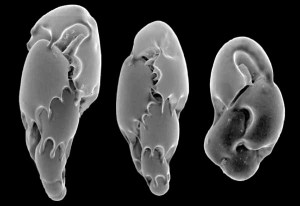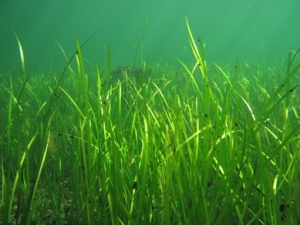Scientific consensus suggests that as a result of mans CO2 emissions the oceanic carbonate system is changing – lowering the pH of these precious waters, creating a more acid environment. This profoundly changing chemistry could have a major effect on oceanic biology in the near future…
Most people agree that since the industrial revolution began and human society started mass use of fossil fuels, CO2 levels have risen in the atmosphere – at no point in the last 650 thousand years has CO2 existed in such large amounts. In more recent times scientists have discovered that whilst 50% of the CO2 released goes into the atmosphere and warms the planet up, a further 30% of the total amount is absorbed by the seas. This uptake of CO2 has decreased the pH of the oceans by 0.1 units in 250 years, a 25% increase in H+ ions as the scale is logarithmic (although the seas will not be vinegar just yet!). Over the last 20 million years there has not been a sharper change in ocean chemistry – worryingly evidence suggests that the ocean system is at risk from such a transformation.
Organisms are adapted to the conditions they live in at the present, if the environment changes slowly, because of natural selection, there will be few consequences for overall species abundance – what is unknown is how a rapid change will affect an ecosystem. The previous major episode of CO2 increase was 55 million years ago, at a point known as the Paleocene-Eocene Thermal Maximum (PETM). During the PETM temperatures rose by 6 degrees Celsius, and because of the more acid seas led to a widespread extinction of foraminifera; small plankton that typically employ calcium carbonate (CaCO3) shells as a means of housing. Interestingly this period gave rise to a major and Earth history defining proliferation in mammalian species but for this article I am concentrating on the seas. The PETM and recent anthropogenic (man-made) release of CO2 have alarming parallels, and it may give a hint to the future of our seas.

More CO2 in the waters leads to a reduction in available calcium carbonate ions (CO32-) making it harder and more energetically expensive to deposit CaCO3 as a shell. Many of the oceans organisms rely on CaCO3 shells: cold and warm water corals, large algae’s, invertebrates like oysters, and plankton. All species are important in an ecosystem but some are particularly vital to the environmental health of an area – the reef building corals of tropical and cold waters are such organisms. Currently 95% of warm water corals live in areas where dissolution of CaCO3 is not a risk but by 2100 70% could live in corrosive waters – this would lead to a loss of habitat stability and with it most of the fish/invertebrates that shelter in such systems; this would ravage regions. The plankton groups of coccolithophores, foraminifera and pteropods are also globally important calcium carbonate users; pteropods are most at danger, given that they survive in cold waters where the change in pH has a bigger effect. However current science suggests there will be both winners and losers here and nothing is certain.
The last point is an important one; obviously changes in ocean chemistry will not harm all species, it’s important not to loose sight of that. Seagrasses could be the biggest winners with more CO2 in the water leading to increased photosynthesis. Zostera marina, a common seagrass, provides habitats for juvenile fish and therefore an indirect effect of increased seagrass abundance may be more adult fish. Photosynthesis rates have also been shown to increase in some species of plankton and jellyfish are already increasing in abundance in the North Sea due to ocean changes – with a possible threat to other forms of life. What emerges is that the ocean ecosystem is complex, far beyond that of any terrestrial environment and knowing the consequences of anything, from an oil spill to changes in chemistry is very hard to infer from experimentation or computer models.

Seagrass beds could dominate future ocean ecosystems.
Ultimately there is still a need for scientific literature. What we know now is that a change is occurring, some species will become extinct, and others will thrive in a new set of conditions – what we don’t know is how this will affect us over the long term, good or bad.
